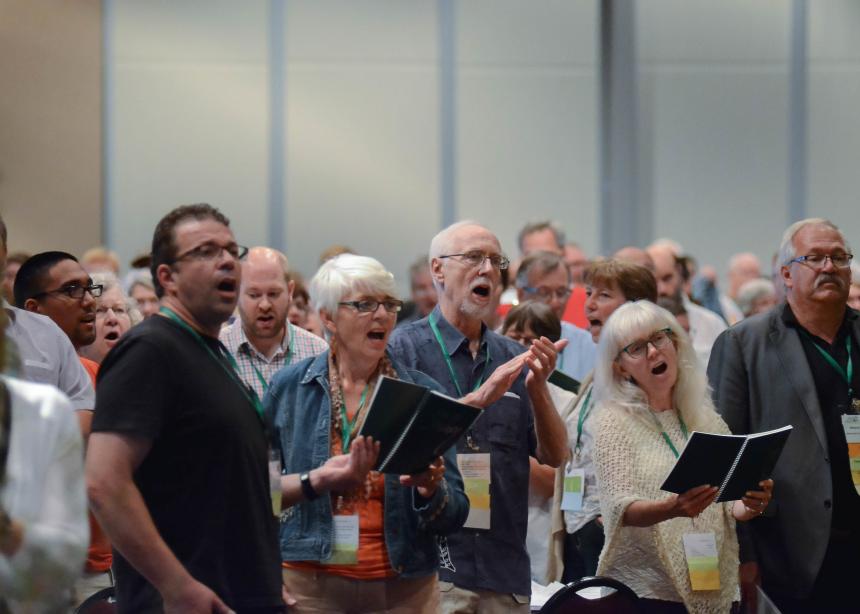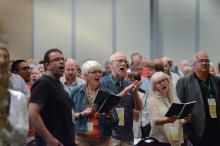“I turned the key and the stillness of the morning was shattered by the uneven rumbling of the engine. Everything was ready for the day’s work. In a few minutes, the pickup would drive onto the farmyard and empty its load of Mexican labourers. But for now I was alone. I eased the clutch out and the tractor lurched forward, pulling the portable packing shed behind it into the orchard. Then, as the sun’s rays appeared over the Sierra-Nevada, illuminating the vast San Joaquin Valley, the beauty of this new day struck me. Over the incessant chug, chug, chugging of the old tractor, I burst into song: ‘When morning gilds the skies, my heart awaking cries, may Jesus Christ be praised!’ So I ask you, ‘Why do we sing hymns anyway?’”
Those were the opening comments by Curtis Funk in a recent sermon at Point Grey Inter-Mennonite Fellowship in Vancouver, B.C. A retired Wheaton College music professor, Funk interspersed his comments about the value of music with congregational hymn singing and Scripture, stressing the importance of corporate worship.
“We sing not only because of the admonition to do so, but because it is a unique corporate experience, an activity we all do together,” he said.
Singing together, he said, is one of the best mediums for worship because, “though we participate individually, we do it corporately.” He pointed out that combining various harmonic parts and instruments heightens the experience.
“True worship directs us toward its object: the Lord. It is God-directed; not primarily admonition, or testimony, but praise for God’s presence and direction in our individual lives and in our community,” he said, quoting Psalm 96: “Ascribe to the Lord in his glory due his name. . . . Worship the Lord in the splendor of his holiness; tremble before, him all the earth.”
Funk grew up in small-town Alberta, attending a Nazarene church and knowing little about his Mennonite heritage or music. He was introduced to church music at Tabor College in Kansas.
“I was a member of . . . the Concert Choir,” he said. “Our work for that term included . . . Brahms’ German Requiem with the choirs from the other two Mennonite colleges—Bethel and Hesston. I shall never forget the dress rehearsal. As an 18-year-old, I experienced a moment that I can only describe as transcendent.
“When we were singing the (Brahms) text ‘joy everlasting shall be upon their heads,’ it seemed like time stood still. And it seemed like the entire choir and the conductor were experiencing this together. I was transported into another reality. It was an experience . . . beyond my normal experiences of life . . . something I could not explain. I believe we all long to have peak experiences like this in worship. . . .These kind of experiences are what draws us back again and again to this room, to these people, to our great God.”
Funk said, “I will admit to a type of idolatry: the music is usually more compelling than words. It is the music that draws me in, that lifts my spirits. The ascending melodic line touches our emotions and we are moved . . . especially when we sing with understanding.”
He described a moment from a recent Sunday service that moved him. “Singing The Love of God is Greater Far [was] familiar, and not normally transcendent for me. But the verse with the image of writing down the dimensions of God’s love—picturing the sky as our stationery and having an ocean-full of ink to write—what a transcendent image. I could barely sing.”
For Funk, music, especially when he participates, becomes a vehicle that can best be described as sublime, “a moment of such excellence, grandeur or beauty as to inspire awe. And almost the only time that happens now in church is in the singing of hymns.”
“For me, hymns should point to the central message of our Christian faith: Jesus is Lord!” he said.
“Despite my admitted love of the music over words, words are important. They carry more explicit meaning than do the combination of sounds we call music. A good marriage of music and text can produce a profound sense of worship.”
Related stories:
Voices Together taking pre-orders, website redesign goes live
Come to the table
Bringing diverse voices together
Is there such a thing as a Mennonite song?




Add new comment
Canadian Mennonite invites comments and encourages constructive discussion about our content. Actual full names (first and last) are required. Comments are moderated and may be edited. They will not appear online until approved and will be posted during business hours. Some comments may be reproduced in print.